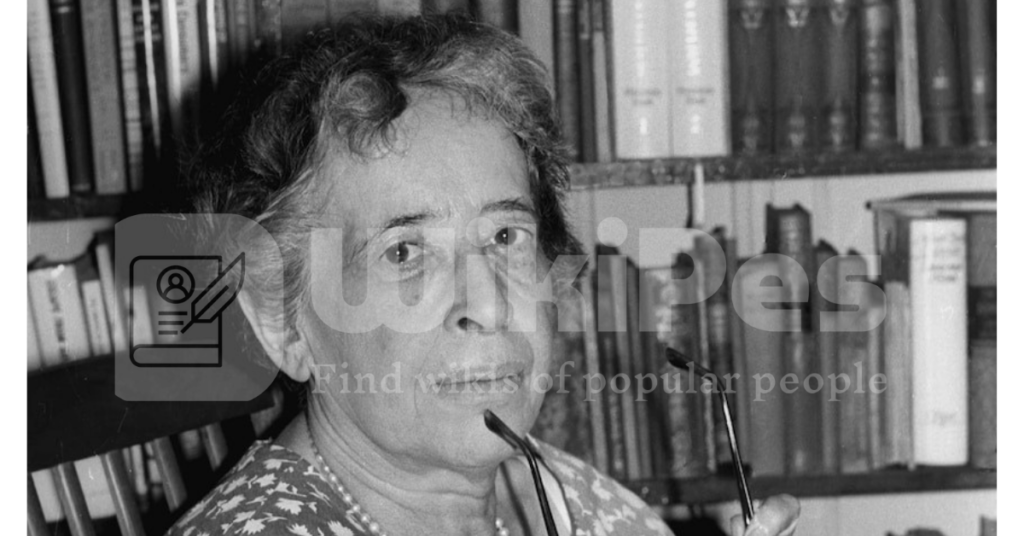Hannah Arendt’s Biography, Age, Height, Husband, Net Worth, Family

Hannah Arendt, an influential philosopher and political theorist, continues to captivate minds with her insightful ideas. Born in 1906, Arendt’s life was marked by her intellectual pursuits and contributions to the field of philosophy. But who was she exactly? Let’s delve into her biography, uncovering details about her personal life, notable works, and lasting impact on the world.
Hannah Arendt’s unique perspective on power, totalitarianism, and the human condition remains relevant even today. With her groundbreaking works like “The Origins of Totalitarianism” and “The Human Condition,” she shaped our understanding of political theory and philosophy. This 20th-century thinker explored complex concepts with an analytical mind and unparalleled clarity.
Born in Germany and later becoming a naturalized American citizen, Hannah Arendt’s life was impacted by the tumultuous events of the 20th century. From her encounters with totalitarian regimes to her experience as a Jewish refugee, her journey is intertwined with her intellectual pursuits. Get ready to unravel the life and ideas of this remarkable woman who left an indelible mark on the world of political philosophy.
So, grab your seat and fasten your seatbelts as we embark on a fascinating exploration of Hannah Arendt’s life, ideas, and extraordinary contributions to the world of philosophy and political theory. Get ready to be inspired by her intellectual prowess and gain valuable insights into the complexities of power, freedom, and the human experience. Let’s dive in and discover the captivating world of Hannah Arendt!
Hannah Arendt, a prominent political theorist, and philosopher, was born on October 14, 1906, in Germany. However, details regarding her height and weight remain undocumented. Despite this, her intellectual contributions and professional achievements were significant. Arendt’s influential works, such as “The Origins of Totalitarianism” and “The Human Condition,” explored topics of power, violence, and the nature of political action. She also wrote extensively on totalitarianism, bureaucracy, and the nature of evil. Although her net worth and income are not widely known, her contributions to philosophy and political theory remain highly regarded.
Hannah Arendt Height, Weight, Age, Stats, Wiki, And More
| Information | Details |
|---|---|
| Name | Hannah Arendt |
| Date of Birth | October 14, 1906 |
| Nickname | N/A |
| Age | 69 |
| Profession | Philosopher, Political Theorist |
| Weight | Unknown |
| Net Worth | Unknown |
| Hair Color | Brown |
| Body Measurement | Unknown |
| Eye Color | Blue |
| Birthplace/Hometown | Hannover, Germany |
| Gender | Female |
| Ethnicity | Jewish |
| Nationality | German, later American |
| Sexuality | Straight |
| Sun Sign (Zodiac Birth Sign) | Libra |
| Religion | Judaism |
| House Location | Various locations throughout her life |
| Wiki Page | Hannah Arendt – Wikipedia |
| Facebook Link | N/A |
| Twitter Profile Link | N/A |
Physical Statistics
| Information | Details |
|---|---|
| Eye Color | Brown |
| Height (Tall) | 5′ 6 |
| Weight | Unknown |
| Hair Color | Dark Brown |
| Profession | Philosopher |
| Shoe Size (UK) | 7 |
Family
| Information | Details |
|---|---|
| Parents – Father | Paul Arendt |
| Parents – Mother | Martha Arendt |
| Husband/Spouse | Heinrich Blücher |
| Siblings | She did not have any siblings. |
The Life and Legacy of Hannah Arendt
Hannah Arendt is widely regarded as one of the most influential political theorists and philosophers of the 20th century. Her groundbreaking ideas on totalitarianism, authority, power, and the nature of human existence have left an indelible mark on the intellectual landscape. In this article, we delve into the life, achievements, and personal details of this remarkable woman.
Hannah Arendt’s Early Life
Hannah Arendt was born on October 14, 1906, in Linden, Germany, into a Jewish family. Growing up in Königsberg, East Prussia, she developed a passion for philosophy and politics from an early age. Arendt studied at the University of Marburg, where she attended lectures by renowned philosophers Martin Heidegger and Karl Jaspers. These formative years heavily influenced her intellectual development and set the stage for the extraordinary contributions she would make later in life.
Education and Academic Pursuits
Arendt completed her doctorate in philosophy at the University of Heidelberg in 1929. Her dissertation focused on the concept of love in the works of Saint Augustine, establishing her as a rigorous and independent thinker. She then embarked on a remarkable academic career, working as an assistant at the German Research Institute for History in Berlin. Despite facing discrimination as a Jewish woman, Arendt’s intellectual prowess and determination propelled her forward.
A Life Interrupted by Totalitarianism
The rise of Adolf Hitler and the Nazi regime drastically altered the course of Hannah Arendt’s life. As a Jewish intellectual, she was forced to flee Germany in 1933 and found refuge in France. However, when France was occupied by Nazi forces in 1940, Arendt was interned in a detention camp. Escaping in 1941, she made her way to the United States, where she would spend the rest of her life.
Professional Achievements and Contributions

In the United States, Hannah Arendt embraced her role as a thinker, writer, and educator. She taught at various universities, including the University of Chicago and The New School. Arendt’s work touched on a wide range of topics, including the nature of power, the essence of evil, the meaning of freedom, and the role of violence in society. Some of her most significant works include “The Human Condition,” “The Origins of Totalitarianism,” and “Eichmann in Jerusalem: A Report on the Banality of Evil.”
Arendt’s Personal Life and Family

In addition to her intellectual pursuits, Hannah had a complex personal life. She was married twice, first to Günter Stern and later to Heinrich Blücher. Despite the challenges they faced over the years, including Hitler’s rise to power and their subsequent emigration, both marriages were significant sources of support and companionship for Arendt. She was also close friends with notable intellectuals such as Mary McCarthy and Karl Jaspers, fostering a vibrant intellectual and social circle.
The Impact of Arendt’s Work
Hannah Arendt’s ideas continue to resonate with scholars, activists, and thinkers across the globe. Her exploration of the nature of power and the dangers of totalitarianism offers profound insights into the mechanisms of oppression and the importance of individual responsibility. Arendt’s concepts of “the banality of evil” and “the public realm” have become seminal in understanding the complex dynamics of modern society and democratic governance.
Legacy and Enduring Influence
Hannah Arendt’s impact extends far beyond her lifetime. Her ideas continue to be studied, debated, and applied in various fields, including philosophy, political science, sociology, and history. Arendt’s rigorous intellectual approach and her commitment to truth and justice serve as an inspiration to future generations of scholars, activists, and critical thinkers.
In summary, Hannah Arendt’s life and work are a testament to the power of critical thinking and the pursuit of truth. Her unwavering intellectual integrity, despite facing immense personal challenges, has left an indelible mark on the world. Through her profound writings and groundbreaking ideas, Arendt’s legacy endures, reminding us of the importance of engaging with complex political and philosophical questions to ensure a more just and free society.
Fascinating Things You Didn’t Know About Hannah Arendt
- Hannah Arendt was a renowned philosopher and political theorist.
- She was born on October 14, 1906, in Germany.
- Despite her intellectual achievements, Hannah Arendt’s height and weight are not well-documented.
- Her net worth is unknown, as she valued intellectual and philosophical pursuits over material wealth.
- Hannah Arendt had a strong sense of independence and was known for her individualistic mindset.
- She belonged to a Jewish family and had to flee Europe during World War II due to the rise of Nazi Germany.
- Her family played a significant role in shaping her worldview and her understanding of politics.
- Hannah Arendt is best known for her works on totalitarianism, power, and the nature of evil.
- Her book “The Origins of Totalitarianism” remains a seminal work in political science.
- Hannah Arendt’s contributions continue to inspire and provoke thoughtful discussions on democracy and human rights.
Frequently Asked Questions
Here are some frequently asked questions related to Hannah Arendt:
What is Hannah Arendt’s height and weight?
Hannah Arendt’s height and weight are not widely documented or available. As a renowned philosopher and political theorist, her physical attributes were not the focus of public interest or discussion. It is important to note that Hannah Arendt’s intellectual contributions and ideas are her most significant and enduring legacy. Her extensive writings on topics such as power, totalitarianism, and the nature of evil have had a profound impact on the fields of philosophy and political science. Rather than focusing on her physical appearance, it is more enlightening to delve into her intellectual achievements and the profound insights she provided through her work.
What is Hannah Arendt’s net worth?
As a philosopher and academic, Hannah Arendt did not accumulate substantial wealth. Her primary focus was on her intellectual pursuits and contributions to the field of political theory. It is, therefore, difficult to estimate her net worth, as it was not a defining aspect of her life or career. Instead, it is more valuable to explore and appreciate the impact of Arendt’s ideas and writings, which continue to resonate and inspire critical thinking in contemporary society. Her works such as “The Origins of Totalitarianism” and “The Human Condition” are regarded as groundbreaking and continue to shape academic discourse.
Can you provide some personal details about Hannah Arendt?
Hannah Arendt was born on October 14, 1906, in Hanover, Germany. She came from a Jewish family and later fled Germany in 1933 after the rise of the Nazi regime. Arendt’s personal experiences of totalitarianism and persecution greatly influenced her philosophical and political perspectives. She spent several years as a stateless person before eventually emigrating to the United States in 1941. In the US, Arendt became a naturalized citizen and began her academic career, teaching at various institutions such as the University of Chicago and The New School. Her journey, marked by resilience and intellectual rigor, informs much of her work.
How did Hannah Arendt contribute to her field?
Hannah Arendt made substantial contributions to the fields of philosophy and political theory. She is best known for her exploration of the nature of power, the origins of totalitarianism, and the concept of evil. Her work challenged prevailing assumptions and generated important discussions. One of her most influential ideas is the concept of the “banality of evil,” articulated in her book “Eichmann in Jerusalem: A Report on the Banality of Evil.” Arendt’s analysis of the trial of Adolf Eichmann, a high-ranking Nazi official, highlighted the idea that evil acts can be perpetrated by ordinary individuals who simply follow orders, without reflecting on the moral consequences of their actions.
What was Hannah Arendt’s impact on the field of philosophy?
Hannah Arendt’s impact on the field of philosophy is profound. She challenged established philosophical traditions and introduced new ideas and perspectives. Her work emphasized the importance of political participation, the nature of power, and the human condition. Arendt’s theories, grounded in a deep exploration of the human experience, continue to shape contemporary political and philosophical discourse. Her critical analysis of totalitarianism and her exploration of the concept of natality (the capacity to start something new) have had a lasting impact on discussions of power, freedom, and individual agency.
Hannah Arendt was an important philosopher and political thinker. She believed in the power of thinking and questioning. Arendt taught us that we should think critically about the world around us and not blindly follow others. She believed in the importance of individual freedom and the responsibility to stand up for what is right. Arendt’s ideas continue to inspire and remind us to think for ourselves.
Wrap-Up
In a world where it’s easy to just go along with the crowd, Hannah Arendt encourages us to think. She reminds us that our thoughts and ideas matter. We should never be afraid to question and challenge the status quo. So let’s not forget the lessons from Hannah Arendt – let’s be thinkers, not followers.






